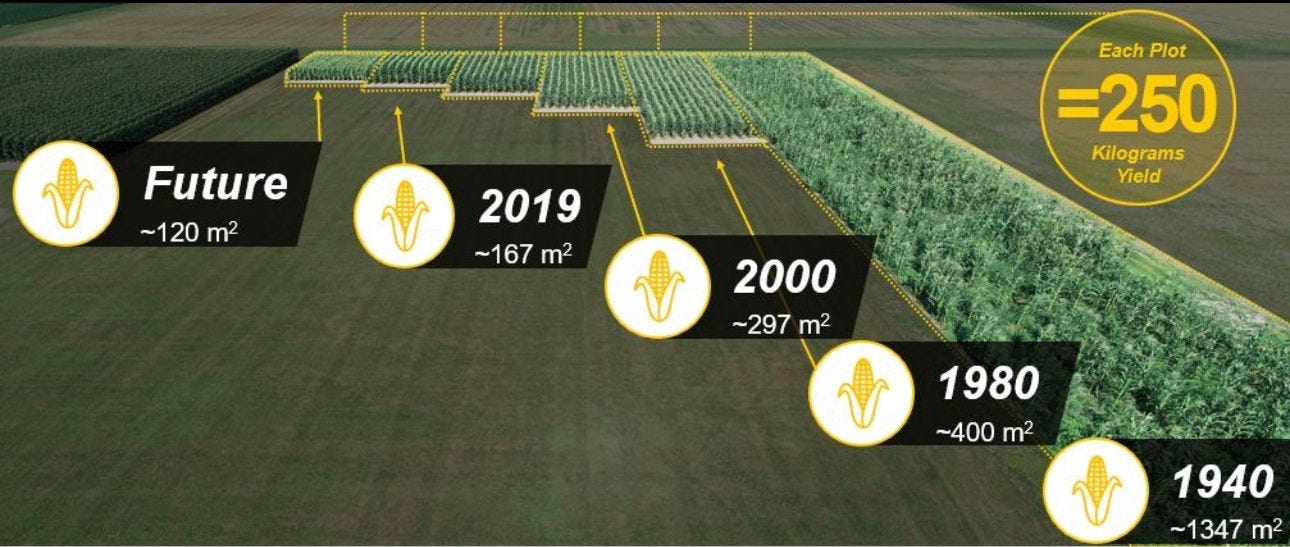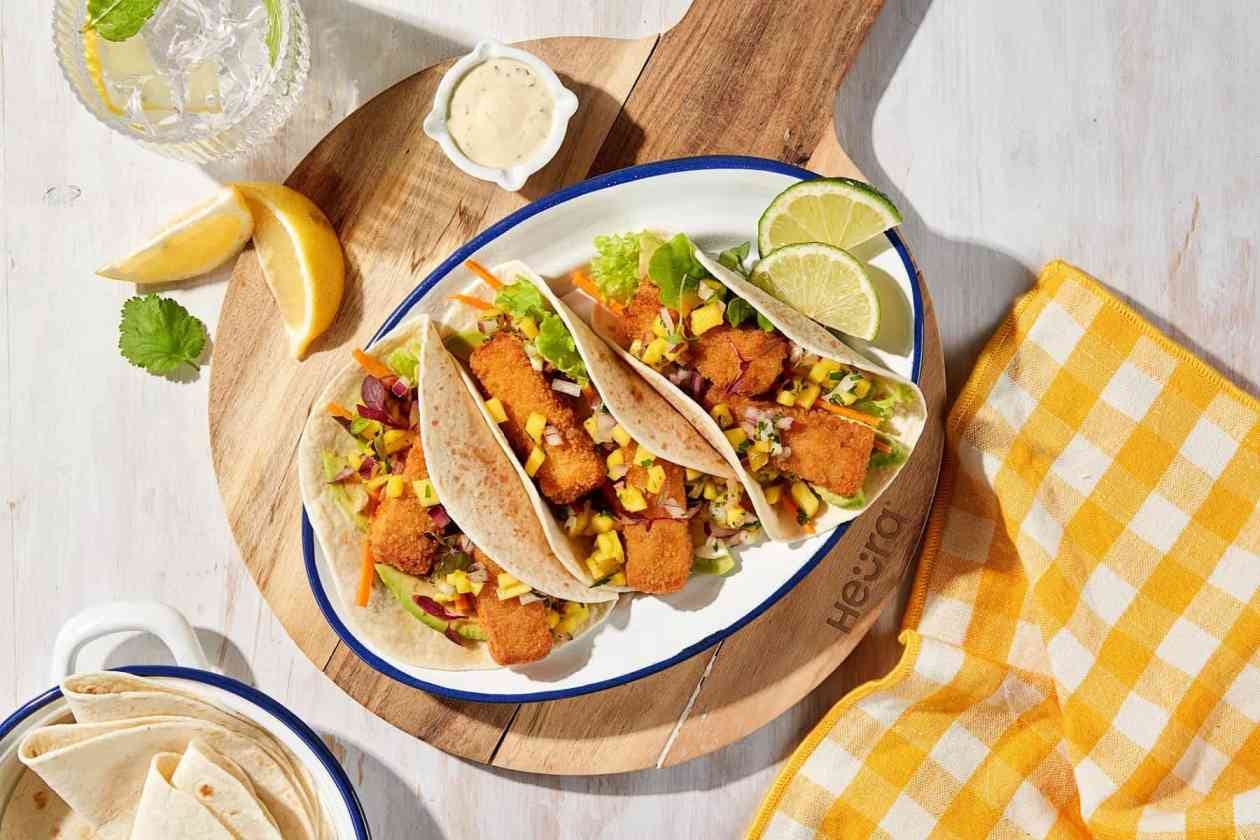Cultivated Chicken for $6/lb, Solar Foods to Go Public, and Abu Dhabi Doubles Down on Alt Proteins
Also: Investment in agriculture gene editing increased 206% YoY in H1 2024
Hi, welcome to issue #71 of the Better Bioeconomy newsletter. Thanks for being here!
Here’s my favourite quote image that I came across while working on this week’s issue:
“Modern farming methods have lifted millions of people out of poverty.
→ Agrochemicals.
→ Mechanization.
→ Genetics.
We can feed more people and preserve biodiversity by improving land-use productivity through increasing crop yields.”
Let’s dig into the latest developments in biotech, shaping the future of food! 🍽
BIO BUZZ
🍗 A breakthrough study explored how continuous manufacturing can bring down cultivated chicken prices to $6/lb
The study by Believer Meats and the Hebrew University of Jerusalem used tangential flow filtration (a method for separating and purifying cells from a liquid mixture) and a novel bioreactor setup. It achieved a biomass expansion of 130 billion cells per litre, yielding 43% weight per volume.
Another significant breakthrough in the study was the development of an animal-free culture medium that costs only $0.63 per litre. The high cost of media has been a major barrier to commercial viability.
The study is said to be the first to empirically demonstrate the cost-effective manufacturing of cultivated meat. Projections show that 2.14 million kg of cultivated chicken could be produced annually at cost parity with USDA organic chicken in a 50,000-liter facility.
Source: vegconomist
🇦🇪 NUOS partnered with Abu Dhabi Growth Fund to establish the ‘world's most advanced’ facility for large-scale alt protein production
As part of this partnership, the Swiss alt protein producer will establish its headquarters in Abu Dhabi. The strategic location is intended to leverage the region’s resources and connectivity, aiming to serve Europe, North America, and the Middle East and North Africa (MENA).
The partnership is expected to make NUOS a leading contract development and manufacturing organization for alt proteins, focusing on achieving scale, quality, and price parity with conventional meat products.
NUOS will collaborate with Abu Dhabi-based R&D institutes and universities to advance sustainable food technologies and develop talent in the sector.
Source: Cell Base
🐶 Calysta's air-based protein is now available for pet food manufacturers across Europe
The multinational biotech company has introduced FeedKind Pet, an air-based protein designed for pet food, to the European market. The product caters to growing consumer demand for nutritious and sustainable pet food.
The first large batch of FeedKind Pet, originating from Calysseo’s production facility in China, has been shipped to Poland. Calysseo, a joint venture between Calysta and Adisseo, operates two fermenters each with a 10,000-ton capacity.
FeedKind Pet provides a complete amino acid profile and is highly digestible, making it suitable for various pet food products, including dry kibble, canned food, and treats. It also contains postbiotic properties that promote gut health.
Source: vegconomist
🐾 Mars Petcare and Big Idea Ventures launched a program aimed at startups to create sustainable pet food through novel proteins and fats
In collaboration with Bühler and AAK, the initiative targets startups working on using human food innovations with the potential to reduce carbon emissions in pet food.
Startups will be evaluated based on the uniqueness and innovation of their solutions, scalability, measurable potential to reduce carbon emissions, and willingness to collaborate openly with program partners.
The application deadline is September 10. Selected startups will participate in online sessions during October and November. The program concludes in a showcase event during Singapore International Agri-Food Week on November 18-22, where startups will present their innovations to a high-profile audience.
Source: Green Queen
🇵🇹 Researchers at Técnico Lisboa created cultivated sea bass fillets using 3D bioprinting with microalgae inks
The team at Técnico Lisboa, part of the University of Lisbon, initially produced thin, sashimi-like slices of cultivated sea bass. However, they've now advanced to creating fillets that are up to six centimetres thick.
These fillets successfully replicate the texture and aroma of traditional sea bass, thanks to the use of microalgae-based bioinks. The researchers used 3D bioprinting to assemble cells into larger biomass, creating products like fish fillets.
To improve the consumer experience, the researchers are developing bioreactors that apply small electric shocks to align the cell cultures, enhancing the fillet's fibrous texture.
Source: vegconomist
🇮🇳🇦🇺 India and Australia have opened applications for a Climate Smart Agritech cohort, offering up to $50,000 for eligible startups
The governments of India and Australia have launched applications for the second round of the Climate Smart Agritech cohort as part of the RISE (Rapid Innovation and Start-up Expansion) accelerator.
The programme, which offers up to $50,000 (A$75,000) in non-equity funding, is designed to support startups developing innovative technologies to optimize resource use, enhance productivity, and lower on-farm emissions.
Startups younger than 10 years, based in India or Australia, can apply. The nine-month programme includes online and in-person learning, field trials, and Immersion Weeks in both countries.
Source: Green Queen
🧠 Pythag Tech launched the Clean Meat Terminal, a new all-in-one market intelligence platform for cultivated meat
CMT provides a comprehensive data source tailored to industry stakeholders. It includes detailed metrics on companies, access to academic and industry research, tools for locating products and facilities, and the latest industry-specific news.
Unlike traditional, more expensive options, the platform is designed to be affordable and accessible to a broad audience, including individuals, businesses, and academic institutions.
CEO Sami Nabulsi noted that while scepticism about cultivated meat persists, Pythag Tech is committed to providing the tools and data necessary to support the industry's long-term development.
Source: vegconomist
🏭 Inari marked its largest expansion with the opening of a new 42,000 ft2 facility in Indiana
The facility will focus on advancing SEEDesign™ technology, which combines AI-powered predictive design with multiplex gene editing to develop higher-yielding seeds.
CEO Ponsi Trivisvavet called the expansion a key step in scaling operations to deliver innovative seed products to a wider market. The new facilities will allow the company to target a broader range of crops.
The $20 million expansion includes doubling greenhouse space, adding advanced LED lighting, and increasing office and warehouse capacity, which will lead to more job opportunities at the site.
Source: iGrow News
MACRO STUFF
📈 The booming alt protein sector in Catalonia includes 103 companies and generates €269M in revenue
With the global market for alt proteins expected to reach $1 trillion by 2040, Catalonia is well-positioned to capitalize on this growth. The region's diverse ecosystem includes food innovators from startups to established companies, ingredient suppliers, and research centres.
The sector is in an ‘expansion’ phase, with 36.9% of the companies being less than ten years old and over two-thirds classified as small and medium-sized enterprises (SMEs). Almost 70% of these companies are exporting, with a significant portion regularly exporting their products.
Catalonia's government actively supports the sector through substantial investments, including €7 million for Spain's first Center for Innovation in Alternative Proteins (CiPA) and €12 million for a pre-industrial facility in Alcarràs.
Source: vegconomist
🇦🇺 Australia could be the next biotech hotspot
Australia is positioning itself as a future leader in biotech, particularly in synthetic biology, by leveraging its vast natural resources and focusing on sustainable biomanufacturing practices.
Significant government investment supports this shift, including a $22.7 billion Future Made in Australia package and a $15 billion National Reconstruction Fund.
The government-funded CSIRO plays a crucial role in workforce training and supporting startups through its Synthetic Biology Future Science Platform. Additionally, CSIRO’s venture arm, Main Sequence Ventures, has invested over $1 billion in 51 companies.
Source: SynBioBeta
BIO BUCKS
🇫🇮 Solar Foods plans to go public with a technical listing on the Nasdaq First North Growth Market in Helsinki
The Helsinki-based company will pursue the technical listing in September, allowing it to sell existing shares without raising new capital.
Solar Foods aims to use the public listing to accelerate global growth by scaling production, launching new products, and making strategic acquisitions. The listing will also boost the company’s profile and credibility among stakeholders, customers, and potential employees.
Solein protein generates only 1% of the emissions compared to conventional meat. Solar Foods was the first private Finnish company to earn a Nasdaq Green Equity Designation, awarded to businesses with over half of their revenue from green activities and less than 5% from fossil fuels.
Source: Green Queen
💰 Naplasol acquired Mycorena
Following financial difficulties and a bankruptcy filing, Mycorena, a Swedish pioneer in mycoprotein production, has been acquired by Naplasol, a company within the VEOS Group.
Naplasol, which specializes in biomass fermentation for producing mycoproteins, plans to integrate Mycorena’s technologies and products, particularly focusing on producing Mycorena’s flagship product, Promyc.
Established in 1974 and headquartered in Belgium, VEOS Group is a global leader in the animal protein market. The group operates extensive production facilities worldwide and serves diverse industries, including food, pet, and animal feed, supported by a robust global sales network.
Source: vegconomist
🍼 De Novo Foodlabs secured $1.5M in fresh funding for precision-fermented lactoferrin protein
This brings the North Carolina-based startup’s total funding to $4M, including a $2.5M pre-seed round in 2022. With the new funding, De Novo Foodlabs aims to scale production from kilograms to tonnes, enabling them to meet the rising demand from food, beverage, and supplement industries.
The startup's primary product, NanoFerrin, is an animal-free, precision-fermented version of lactoferrin. The protein is crucial for infant development and offers various health benefits for adults, including improved immunity, brain health, and iron absorption.
Lactoferrin is in limited supply and expensive to produce, requiring over 10,000 liters of milk to produce just 1kg, which pushes retail prices to between $750 and $1,500 per kilogram.
Source: Green Queen
🧬 Investment in agriculture gene editing increased 206% YoY in H1 2024
Agriculture-related gene editing startups have raised over $161 million in the first half of 2024, marking a significant improvement compared to just $46 million raised in the same period of 2023.
The H1 2024 figures also exceed H1 2022 by 140%. However, it remains to be seen if the total for 2024 will surpass the $241 million raised in the full year of 2022.
While the recent uptick is promising, the investment levels are still below pre-COVID peaks, except for a notable low in 2017 when only $58 million was raised.
Source: AgFunder
SOUND BITES
🛍 The role of bio strategy in shaping the future of consumer products
APAC AGRI-FOOD INNOVATION SUMMIT
🤝 Meet 1000+ global leaders who are accelerating climate-adaptation strategies for food security in Asia
Better Bioeconomy is excited to be a media partner for the Asia-Pacific Agri-Food Innovation Summit, taking place at Marina Bay Sands on November 19-21!
As the anchor event of Singapore International Agri-Food Week (SIAW), in collaboration with Temasek, the Singapore Food Agency (SFA), and Enterprise Singapore (ESG), the Asia-Pacific Agri-Food Innovation Summit will bring together over 1000 global leaders to identify the strategic priorities as we build greater capacity, security, and resilience in Asia’s agri-food system.
🙌🏾 Use my discount code ‘BIO10’ to save SGD $650 – offer ends Thursday, August 29.
MORE ON BETTER BIOECONOMY
💬 My conversations with bioeconomy innovators
Biotech consultant and ex-CSO of Vow, James Ryall: Bridging Science and Business to Support Startups Using Biomanufacturing
Synonym's co-founder, Joshua Lachter: Financing and Developing Infrastructure for the Bioeconomy
Bioshyft's founder, Gerrit Feuerriegel: Connecting Innovators, Investors, and Incumbents to Drive the Bioeconomy
Terra Bioindustries’s CMO, Rebecca Palmer: Turning Agrifood Byproducts Into Nutrient-Rich B2B Ingredients
That’s a wrap. Thank you for taking the time to read this issue!
Are you new here?
Know anyone else who would dig this newsletter?








Outstanding work! Thank you very much for taking the considerable time and effort to create your excellent updates. The community appreciates all your dedication 👏
I would like to try 🤷